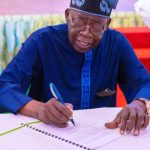Nigeria’s $3bn Share of Africa’s $75bn FDI Unacceptable – Buhari
August 12, 2021
President Muhammadu Buhari has said Nigeria’s low share of Foreign Direct Investment (FDI) flow to Africa between 2015 and 2019 is a cause of concern.
Buhari, who spoke at a retreat organised by the Nigeria Extractive Industries Transparency Initiative (NEITI) in Uyo, the Akwa Ibom State capital, described the situation as unacceptable.
In another development, United States President Joe Biden’s top aides are pressuring the Organisation of Petroleum Exporting Countries (OPEC) and its allies to boost oil output to tackle rising petrol prices, which the US sees as a threat to global economic recovery, Reuters reported yesterday.
But in Nigeria, Buhari reaffirmed the country’s commitment to using the Extractive Industries Transparency Initiative (EITI) to implement reforms and enhance revenue growth.
Despite having the biggest economy in Africa, Nigeria only received four per cent, which was about $3 billion of the $75 billion invested in the continent in the first term of Buhari’s administration.
According to the United Nations Conference on Trade and Development (UNCTAD) 2020 World Investment Report, FDI flows to Nigeria showed a 48.5 per cent decrease compared to the previous year.
Nigeria has a poorly developed transport and energy infrastructure, resulting in high operating costs, an inefficient judicial system and unreliable dispute settlement mechanism as well as serious security concerns.
According to Arise News report, Buhari, who was represented at the occasion by the Secretary to the Government of the Federation (SGF), Mr. Boss Mustapha, urged the new NEITI board to build on the efficiency and ramp up on-going reforms in the oil and gas as well as mining sectors.
The president explained that NEITI’s work strongly aligned with the vision of his administration to provide a robust governance framework in the oil and gas and mining sectors and guarantees professionalism, transparency, accountability, good returns on investment, as well as improved revenue for the country. He urged the new board to provide the required leadership and strategic direction for NEITI to channel similar attention it had shown in the oil and gas industry to the solid minerals sector to galvanise reforms in the sector.
Buhari stated, “The board of NEITI must articulate a new approach and seek productive collaborations, where necessary, to make Nigeria investment destination and dramatically increase the quantum of investments to the country.
“It is unacceptable, a situation where only $3 billion came to Nigeria out of the $75 billion investment in the extractive industry that came into sub-Saharan Africa.”
He charged the new board members to avoid acts capable of disrupting the day-to-day management of the agency.
“I have witnessed a lot of disruptions to agency activities due majorly to a misunderstanding and at times deliberate misinterpretation of roles,” he stressed.
In his remarks, the chairman of the board, Mr. Olusegun Adekunle, pledged the commitment of the team to push the boundaries of EITI implementation in Nigeria to achieve results.
Executive Secretary of NEITI, Dr. Ogbonnaya Orji, explained that the retreat was designed to expose members of the board to the methods, principles and benefits of EITI in Nigeria. Orji added that the retreat, which had global and national experts on EITI, law, public policy and administration as resource persons, was put together to build the capacity of the board to take up its leadership role with adequate knowledge and competence.
Head of the international secretariat of EITI, Dr. Mark Robinson, in a message from the organisation’s headquarters in Oslo, Norway, said the world body was ready and willing to offer technical assistance to the new board in the performance of its functions.
Meanwhile, Biden’s aides are pressuring OPEC and its allies to increase oil output to tackle rising petrol prices, which they see as threating global economic recovery.
Biden’s National Security Adviser (NSA), Jake Sullivan, criticised the world’s major oil producers, including Saudi Arabia, for what he said were insufficient crude production levels in the aftermath of the global COVID-19 pandemic.
“At a critical moment in the global recovery, this is simply not enough,” he said in a statement.
Petrol prices in the United States are running at $3.18 a gallon at the pumps, up more than a dollar from last year at this time, according to the American Automobile Association (AAA).
The unusual statement ratcheted up international pressure and comes as the administration tries to contain a range of rising prices and supply bottlenecks across the economy that have fuelled inflation concerns.
Biden has made recovering from the economic recession triggered by the pandemic a key priority for his administration.
The message also underscored the new dynamic between Washington and OPEC since Biden’s predecessor, Donald Trump, broke with prior practice in demanding specific policy changes to adjust prices.
Trump had threatened to withdraw military support from OPEC leader Saudi Arabia over output, which at the time he thought was too high and hurting U.S.-based drillers.
Biden’s administration is pressing countries within OPEC+, which groups OPEC with Russia and other big producers, “on the importance of competitive markets in setting prices,” Sullivan said, adding, “Higher gasoline costs, if left unchecked, risk harming the on-going global recovery.”

The US government said, “OPEC+ must do more to support the recovery.”
International benchmark Brent crude was trading around $70 a barrel yesterday, down half a per cent, after the US issued its statement, lower than the prices above $77 in early July, but still representing an increase of nearly a third from the beginning of the year.
The Biden administration’s push for lower fuel prices in some way shreds its efforts to secure global leadership in the fight against climate change, an agenda anchored by efforts to transition the economy away from fossil fuels toward cleaner energy sources and electric vehicles.
US oil production has been stagnant at 11 million barrels per day (bpd) since the fallout of the pandemic pulled it from a record high of 12.3 million bpd in 2019.
OPEC+ had implemented a record output cut of 10 million bpd, about 10 per cent of world demand, as global energy demand slumped during the pandemic, but has been gradually raising output since. As of July, the cut had been eased to about 5.8 million bpd.
At a meeting held in July, OPEC+ agreed to boost output by 400,000 bpd a month starting in August, until the rest of the 5.8 million bpd cut was phased out. OPEC+ is scheduled to hold another meeting on September 1 to review the situation.
Group Managing Director of the Nigerian National Petroleum Corporation (NNPC), Mele Kyari, recently said high oil prices were not in the interest of resource-dependent countries, like Nigeria, arguing that the most comfortable threshold would be between $50 and $60.
He argued that if prices continued to rise, it would get to a point that buyers of Nigeria’s crude oil might find other alternatives, which could negatively affect the country’s economy.








